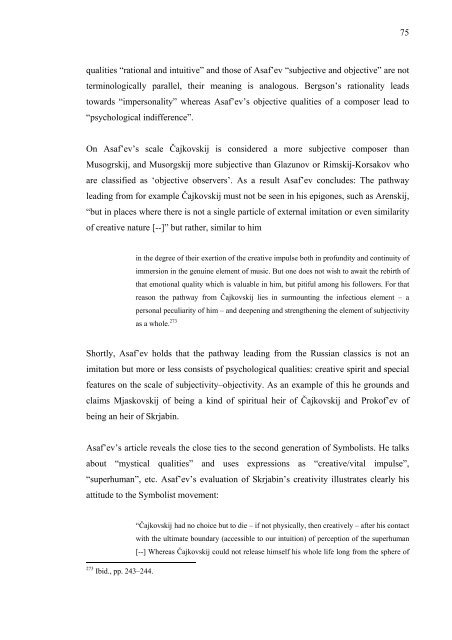Boris Asaf'ev and the Soviet Musicology - E-thesis
Boris Asaf'ev and the Soviet Musicology - E-thesis
Boris Asaf'ev and the Soviet Musicology - E-thesis
You also want an ePaper? Increase the reach of your titles
YUMPU automatically turns print PDFs into web optimized ePapers that Google loves.
qualities “rational <strong>and</strong> intuitive” <strong>and</strong> those of Asaf’ev “subjective <strong>and</strong> objective” are not<br />
terminologically parallel, <strong>the</strong>ir meaning is analogous. Bergson’s rationality leads<br />
towards “impersonality” whereas Asaf’ev’s objective qualities of a composer lead to<br />
“psychological indifference”.<br />
On Asaf’ev’s scale Čajkovskij is considered a more subjective composer than<br />
Musogrskij, <strong>and</strong> Musorgskij more subjective than Glazunov or Rimskij-Korsakov who<br />
are classified as ‘objective observers’. As a result Asaf’ev concludes: The pathway<br />
leading from for example Čajkovskij must not be seen in his epigones, such as Arenskij,<br />
“but in places where <strong>the</strong>re is not a single particle of external imitation or even similarity<br />
of creative nature [--]” but ra<strong>the</strong>r, similar to him<br />
in <strong>the</strong> degree of <strong>the</strong>ir exertion of <strong>the</strong> creative impulse both in profundity <strong>and</strong> continuity of<br />
immersion in <strong>the</strong> genuine element of music. But one does not wish to await <strong>the</strong> rebirth of<br />
that emotional quality which is valuable in him, but pitiful among his followers. For that<br />
reason <strong>the</strong> pathway from Čajkovskij lies in surmounting <strong>the</strong> infectious element – a<br />
personal peculiarity of him – <strong>and</strong> deepening <strong>and</strong> streng<strong>the</strong>ning <strong>the</strong> element of subjectivity<br />
as a whole. 273<br />
Shortly, Asaf’ev holds that <strong>the</strong> pathway leading from <strong>the</strong> Russian classics is not an<br />
imitation but more or less consists of psychological qualities: creative spirit <strong>and</strong> special<br />
features on <strong>the</strong> scale of subjectivity–objectivity. As an example of this he grounds <strong>and</strong><br />
claims Mjaskovskij of being a kind of spiritual heir of Čajkovskij <strong>and</strong> Prokof’ev of<br />
being an heir of Skrjabin.<br />
Asaf’ev’s article reveals <strong>the</strong> close ties to <strong>the</strong> second generation of Symbolists. He talks<br />
about “mystical qualities” <strong>and</strong> uses expressions as “creative/vital impulse”,<br />
“superhuman”, etc. Asaf’ev’s evaluation of Skrjabin’s creativity illustrates clearly his<br />
attitude to <strong>the</strong> Symbolist movement:<br />
273 Ibid., pp. 243–244.<br />
“Čajkovskij had no choice but to die – if not physically, <strong>the</strong>n creatively – after his contact<br />
with <strong>the</strong> ultimate boundary (accessible to our intuition) of perception of <strong>the</strong> superhuman<br />
[--] Whereas Čajkovskij could not release himself his whole life long from <strong>the</strong> sphere of<br />
75

















